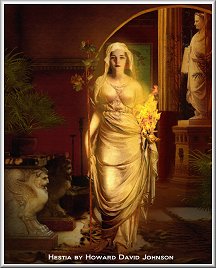
Hestia
by Howard David Johnson
CLICK TO
ENLARGE
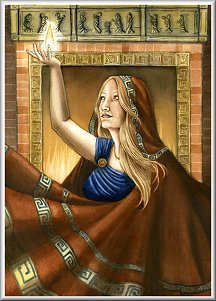
Hestia
CLICK
TO ENLARGE
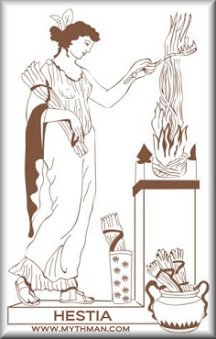
Hestia
CLICK TO
ENLARGE
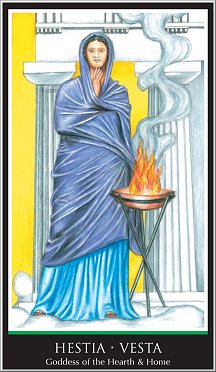
Hestia
CLICK TO
ENLARGE
|
HESTIA PAGE TWO
Hestia was universally revered, not only because she was the
mildest, most upright and most charitable of all the Olympians,
but as having invented the art of building houses.
Although she was rarely depicted in art, and played almost no
part in myths, she was held in the highest honor, by both the
Greeks and the Romans.
A drunken brute named Priapus once tried to violate her
following a feast attended by the gods, after everyone had
passed out from too much food, drink and partying.
Luckily for Hestia, a donkey brayed out loud and she awoke to
find Priapus about to jump into her bed.
Her screams sent the startled Priapus running off in comic
terror.
That myth served to give warning against sacrilegious
ill-treatment of female guests who are under the protection of
the domestic or public hearth.
It's notable that even the donkey, a symbol of lust, is the one
to announce Priapus's criminal intent.
The Roman worship of Vesta, their name for Hestia, was more
elaborate. They believed that her cult was first brought into
their country, Latinum, by Aeneas following his flight from Troy
after that mighty city fell to the Greeks.
One of the early kings of Rome, Numa Pompilius, built a temple
in her honor, where the famous Palladium of Troy was preserved.
It was brought there by Aeneas and believed to be an image of
Athena or a shield that "has fallen out of the heaven."
The welfare of the whole city was believed to depend on the
preservation of the sacred flame kept in the temple and attended
by priestesses called the Vestal Virgins.
Solemn oaths were sworn by the goddess of the hearth, and the
hearth itself was the sacred asylum, where suppliants implored
the protection of the inhabitants of the house.
Every town had a public hearth that similarly was the sacred
asylum in every town. The state usually received its guests and
foreign ambassadors there, and the Vestals had to act the part
of hosts.
When a colony was sent out, the emigrants took the fire which
was to burn on the hearth of their new home from that of the
mother town.
In the event that the fire of Hestia's hearth became
extinguished, it was not allowed to be lighted again with
ordinary fire, but either by fire produced by friction, or by
burning glasses drawing fire from the sun.
First there were four Vestal Virgins, later six; they were under
the control of Pontifex Maximus, the head of the priestly
college which directed the religious affairs in Rome.
When there was a vacancy he was the one who elected a new
Vestal. The candidate had to be between six and ten years old,
perfect in mind and body, and of Italian birth.
The training took ten years, while another ten were spent in
carrying out the sacred duties, and finally, ten more in
training the instructing novices.
At the age of forty, the Vestal was free to return to the
outside world and even take a husband if she wished.
The cult of Vesta was observed in Rome until the year 380, when
the sacred fire was quenched and the priestesses dispersed by
Emperor Theodosius, ushering Christianity.
Hestia, you who tend the holy house of
the lord Apollo,
the Far-shooter at goodly Pytho,
Hestia, with soft oil dripping
ever from your locks,
come now into this house, come,
having one mind with Zeus the
all-wise:
draw near, and withal bestow
grace upon my song.
Homeric Hymn to Hestia
Hestia, in all dwellings of men and
immortals
Yours is the highest honor, the
sweet wine offered
First and last at the feast,
poured out to you duly.
Never without you can gods or
mortals hold banquet.
An offering to Hestia at the beginning of each meal
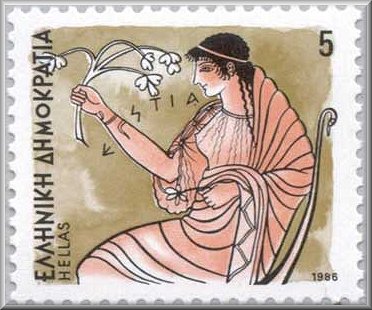
Hestia Greek Postage Stamp

[home] [page one]
[page two]
|







